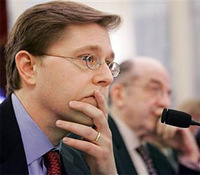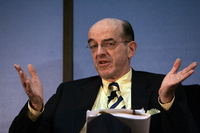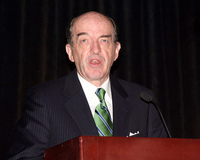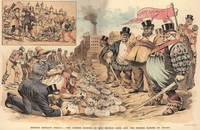 Today is November First, which is
the deadline for comments on the FCC’s media consolidation move.
There’s still
no notice on the FCC web pages of a hearing on November 2.
Today is November First, which is
the deadline for comments on the FCC’s media consolidation move.
There’s still
no notice on the FCC web pages of a hearing on November 2.
Oh, wait! Kevin Martin held a hearing two days earlier, on Halloween instead! Without ever announcing it on the FCC web pages.
Dissident commissioners Michael Copps and Jonathan Adelstein appeared at a rally outside the FCC’s office in Washington to object to Martin’s chicanery. “Neither we nor the public received any confirmation that the hearing would occur until … just 5 business days before the event,” the commissioners said before entering the building for the hearing. “This is unacceptable and unfair to the public.”Jesse Jackson, National Organization of Women, United Church of Christ, Future of the Media Caucus in the U.S. House of Representatives; they all protested.Joining Copps and Adelstein were political, labor and community leaders who condemned Martin’s assault not merely on media diversity but on the basic standards for making regulatory shifts.
— No Treats for FCC Chair and Media Monopolists, John Nichols, The Nation, Wed Oct 31, 6:03 PM ET
Martin even has the Parents Television Council against him.
Notice of a meeting only five days before to the other commissioners, and apparently none to the public? You’d think Martin didn’t know how to talk to the press. Yet just a few days ago he was chatting with the New York Times about ending cable monopolies to apartments.
I wonder if he told the telcos about that Halloween meeting more than five days before? Nah, that would be corruption.
-jsq








